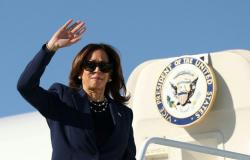Who will win the presidential elections? Many investors are asking themselves this question. But is the answer really decisive – from an investor’s point of view?
If you were to ask me what the most frequently asked question is these days, my answer would certainly be related to the upcoming presidential election in the United States. Its outcome is on the minds of people around the world, for very understandable reasons. The upcoming election is expected to be one of the most important in the sometimes turbulent history of the United States.
As investors, you are, we are, sometimes torn. We are aware of the enormous (geopolitical) importance of this election, especially for us Europeans. And because this is the case, and everything seems linked, the classic question for investors, namely what are the possible consequences of the election result on the capital markets, inevitably arises.
Financial journalists also ask this question, and quite willingly. They have to. After all, they are supposed to write new stories about “the markets” every day or comment on them on the soundtrack. I can say a word about that. During my studies – admittedly, it was some time ago – I ran a small financial editorial office. The search for (good) stories is exciting, but demanding. In this context, an event like the US elections is a very rewarding opportunity. Potential stories are gathered in the blink of an eye. For example, it is possible to note which sectors investors should have in their portfolios in the event of a Republican victory – and which stocks are typically Democratic.
Typical actions of Democrats
From the writer’s point of view, it’s an easy exercise, especially since the deduction seems convincing to readers. Yes, Republicans are concerned with oil or weapons, Democrats with solar and health. It’s that simple – and the text is ready!
All they have to do is be right with their prediction about who will win the election. If necessary, they will simply wait for the election result – and then quickly change horses. That too should pay off.
The analysis of who, from a historical point of view, is better for Wall Street, the Democrat or the Republican, is also very popular. According to the motto: even if history never repeats itself, at least it rhymes.
I can only advise investors not to dwell too much on such advice. At least not if they want to have money in the long term. Don’t base your investment strategy on election forecasts or results. Don’t obsessively look for stocks that will win elections, but rather think in terms of good companies, business models that are attractive and will probably remain so – regardless of who will occupy the White House. In the long run, this strategy should be not only more comfortable, but also better.
“It ends in chaos…”
The year 2016 was a very good example of how predictions can mislead us, even when they were made correctly. Suppose we had known back then, in the spring of 2016, that Donald Trump was going to win in November against Hillary Clinton, the overwhelming favorite. What would we have done?
I suppose that many would have significantly reduced their share of stocks. Trump, chaos and the star of a reality TV show – this can only, it will certainly end in chaos, including on the capital markets. Today we know: It was different. In the following months, the American stock markets rose, and even significantly. Happy are those who did nothing, who did not want to be smarter than the market and who stayed.
There is one thing we can count on, at least that is my experience: Americans think much more entrepreneurially than we do, which is expressed in particular by a deep penetration of the domestic capital market and a very strong stock market culture – in comparison with many European countries.
Even though the political coordinates of the two parties sometimes differ markedly – Democrats, for example, want “big government” and therefore higher taxes, while Republicans, on the other hand, would very much like “the state” to remain outside the lives of Americans – the competitiveness of the American national economy is sacred to both!
“America first”, politically and economically, is therefore not only Trump’s doctrine, it was and remains valid under Biden’s mandate. And it will remain so in the years to come.






